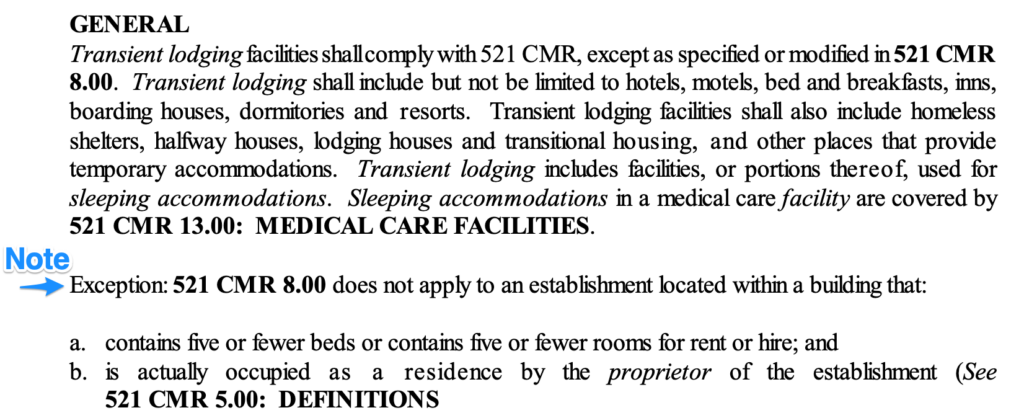First, some caveats …
I am not a lawyer and this is not legal advice.
My goal here is to share the research that I’ve done into new regulations that are coming into play with the advent of a new version of the state building code. This came into full effect on July 1st, 2025.
It’s important to look at the actual text of the building code. There’s a lot of misinformation on this subject out there.
I’m not confident that I’ve researched this completely. My conclusions may not be correct. Please do your own research and draw your own conclusions. Also, please add comments to this post if you have any thoughts or feedback.
That said, here’s what I’ve garnered so far …
Background Info and General Comments
The state’s new building code consists of the 10th edition of the International Building Code (generally referred to as “the IBC“), as modified by state-specific amendments. All this is spelled out in section 780 of the Code of Massachusetts Regulations, which is commonly referred to as “780 CMR“.
780 CMR is subdivided into two parts: The “base code” which references the IBC and amends it, and the “residential code” which references and amends the International Residential Building Code (IRBC).
The fact that the code has multiple sources can be confusing. For example, it’s extremely important to know how certain words are defined. You will find that some terms are used in 780 CMR but aren’t defined there. Instead they’re defined in the IBC.
Some Definitions
DWELLING (IBC Ch2) A building that contains one or two dwelling units used, intended or designed to be used, rented, leased, let or hired out to be occupied for living purposes.
DWELLING UNIT (IBC Ch2) A single unit providing complete, independent living facilities for one or more persons, including permanent provisions for living, sleeping, eating, cooking and sanitation.
LODGING HOUSE (Included in 780 CMR) A one-family dwelling with five or fewer guest rooms where one or more occupants are primarily permanent in nature and compensation is provided for the guest rooms.
TRANSIENT (IBC Ch2) Occupancy of a dwelling unit or sleeping unit for not more than 30 days.
When are inspections required for one and two family dwellings?
Here’s an excerpt from the 780 CMR residential code:

Note that the definition of “Lodging House” is central to the inspection requirements for owner-occupied one and two family dwellings.
When are automatic fire sprinklers required for one and two family dwellings?
Here’s another excerpt from the 780 CMR residential code:


Note the use of the term “short term rental lodging houses”. I haven’t been able to find a definition for this term in 780 CMR or in the IRBC. I’m guessing that a dwelling would have to meet the definition for “lodging house” in order to be considered a “short term lodging house”.
Is your house a “lodging house”?
Note that definition of “lodging house” requires that a dwelling meet 4 conditions in order to be considered a lodging house. It’s my impression that all of these conditions must be met, or else the dwelling isn’t a lodging house.
- It must be a one-family dwelling.
- It must have five or fewer “guest rooms”. (I’m under the impression that the term “guest rooms” includes all rooms which guests have access to, not just bedrooms. So kitchens and living rooms would be counted. I’m not sure about bathrooms.
- One or more of the occupants must be “primarily permanent in nature”.
- Compensation must be provided for guest rooms.
So, can we conclude the following?:
- No two-family house is a lodging house?
- That for an owner-occupied single family house with five rooms, where the owner has a roommate who pays rent, the house is required to have sprinklers?
Accessibility requirements?
Here’s the text of 521 CMR 8.1:

I’ve just skimmed over the tip of the iceberg here …
I could write a great deal more on this subject but I don’t have the time right now. Here are a few final comments …
- As I research this I’m finding a fair amount that is unclear, or even simply doesn’t make sense.
- It’s not clear that all cities and towns will strictly enforce these new provisions. Building officials and inspectors are generally overworked already, and it’s currently a challenge to recruit new building inspectors. If I’m correct that the code is muddled and unclear, that may provide an additional disincentive.
- It would probably be prudent for short-term rental hosts throughout our state to become organized and politically active on this issue, both locally and state-wide. Sprinkler and accessibility regulations have the potential to put many Massachusetts short term rentals out of business. The hotel lobby is active. So are our state’s fire officials, who tend to support anything that will increase fire safety, regardless of the tradeoffs.
Thank you for posting this do you know of any groups that have been established that I can join?